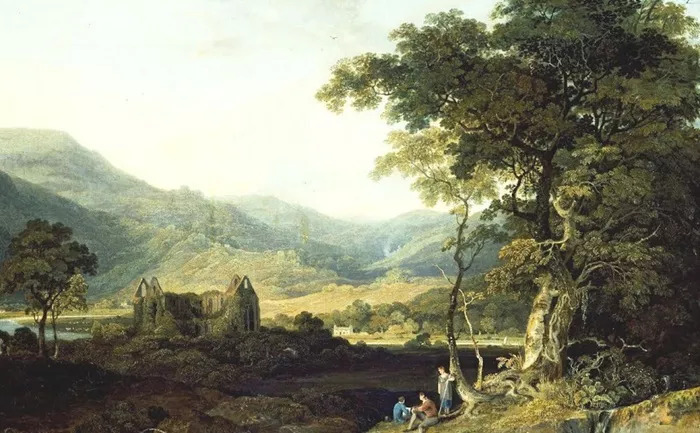Welcome to Poem of the Day – Lines Composed A Few Miles Above Tintern Abbey by William Wordsworth
William Wordsworth’s “Lines Composed A Few Miles Above Tintern Abbey” is one of the most celebrated poems in English literature. Written in 1798 and published in 1799, the poem is part of Wordsworth’s larger body of work that embodies his Romantic ideals. This poem is a reflection on the power of nature, memory, and the growth of the human soul. In this article, we will break down the poem and explain its key themes and ideas in a clear and simple way.
Lines Composed A Few Miles Above Tintern Abbey Explanation
The Setting and Context
The poem is set near the ruins of Tintern Abbey, a famous landmark located along the River Wye in Wales. Wordsworth had visited the area five years prior, and it was during his second visit in 1798 that he wrote this poem. The poem begins with a personal reflection as Wordsworth looks back on his earlier visit to the site and contrasts it with his present understanding of nature.
The Power of Nature
In the opening lines, Wordsworth speaks of the peaceful, restorative power of nature. He feels the landscape around him—its rivers, mountains, and trees—as something deeply soothing. Nature, for Wordsworth, is not just an external environment but something that connects deeply with the inner self. He expresses that the beauty of nature has always been a source of solace for him.
“Five years have past; five summers, with the length
Of five long winters! and again I hear
These waters, rolling from their mountain-springs
With a sweet inland murmur.”
These lines highlight the passage of time and the cyclical nature of life. Nature remains unchanged and eternal, even as human life progresses through seasons and years.
Memory and Growth
A major theme in the poem is the relationship between memory and growth. Wordsworth reflects on how his connection to nature has evolved over time. As a young man, he experienced nature as something external, something to be enjoyed for its beauty. However, as he grows older, he realizes that nature has also become a source of inner peace and moral guidance.
“For I have learned
To look on nature, not as in the hour
Of thoughtless youth; but hearing oftentimes
The still, sad music of humanity.”
In these lines, Wordsworth reflects on the deeper understanding of nature that comes with age. His memories of his earlier visits to the area are now infused with a richer, more reflective understanding. Nature has become a source of wisdom and spiritual comfort.
Nature as a Source of Spirituality
Wordsworth also explores the idea of nature as a spiritual experience. He suggests that nature is not just a physical presence but also a spiritual guide. The poem takes on a meditative tone as Wordsworth speaks of nature as a constant companion, providing strength in moments of difficulty. He describes the beauty of the landscape as something that reaches into his soul.
“That best portion of a good man’s life,
His little, nameless, unremembered acts
Of kindness and of love.”
These lines emphasize that nature’s influence is often subtle but profoundly impactful, teaching qualities such as kindness, love, and a deep connection to the world around us.
The Role of the Poet
Wordsworth also discusses the role of the poet in this poem. He suggests that the poet, like himself, has the ability to connect deeply with nature and convey that connection to others. The poet can help guide others toward the same spiritual understanding of the natural world, sharing the wisdom that comes from this relationship.
“I may be living in a world
Beyond the grave, where all the things of earth
Are subject to a higher law, and here
I see the things of earth.”
Wordsworth’s understanding of poetry is deeply tied to his belief in nature’s spiritual dimension. In his view, poetry allows the poet to communicate these truths, transcending the limitations of the physical world.
The Final Vision
In the poem’s conclusion, Wordsworth expresses a hopeful and comforting vision. He believes that the power of nature and the memories of his experiences will remain with him, even in the future. He looks forward to sharing this vision with his sister, Dorothy, who accompanies him on the trip to Tintern Abbey.
“Therefore am I still
A lover of the meadows and the woods,
And mountains; and of all that we behold
From this green earth; of all the mighty world
Of eye and ear.”
These final lines reveal that Wordsworth’s connection to nature is eternal and will continue to shape his life in the years to come.
Conclusion
Lines Composed A Few Miles Above Tintern Abbey is a poem that explores profound themes of nature, memory, growth, and spirituality. Wordsworth’s reflections on his evolving relationship with nature speak to the larger Romantic ideal that nature has the power to shape the human soul. By contrasting his youthful experiences with nature and his present reflections, Wordsworth demonstrates how time and experience deepen our understanding of the world around us. The poem remains a timeless exploration of the spiritual and restorative qualities of nature.

